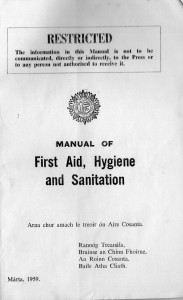 I suppose the army cannot assume any previous level of education or social skills and so we were taught “Hygiene and Sanitation”. This post contains some of my recollections of such “A” matters and may contain scenes which some readers will find upsetting or disturbing.
I suppose the army cannot assume any previous level of education or social skills and so we were taught “Hygiene and Sanitation”. This post contains some of my recollections of such “A” matters and may contain scenes which some readers will find upsetting or disturbing.
Hygiene and Sanitation included how and what bits to wash (the manual included some quite intimate washing instructions for cavalry), how to look after your socks and feet, and also how to fold sheets and make a bed box. Unfortunately when I was first taught this we did not have any sheet to actually demonstrate how to fold and so the instructor improvised using a sheet of paper. We were no wiser when we eventually had to make up our own beds.
The best bit of hygiene advise was given on the square in Waterford one morning by Paddy Whelan if my memory serves. We were discouraged from buttering bread when we first got to sit at table, and then leaving it out until the rest of the food arrived. It was explained that flies would land on the bread and that they would then shite on the bread. As flies themselves ate shite, we were asked to imagine what their shite would be like. I think the message got through.
Many nice south side boys had led a sheltered life before their first camp and may not have been prepared for some of the dire warnings given on first pay day when we were paraded on the square. It was suggested that after payday we might go into the town and perhaps meet a “Pox-bottle”. From the interested looks on the faces of the listeners I think the main thought was “Chance would be a fine thing”, and where might we meet such creatures.
Spitting was specifically mentioned as forbidden in the manual, perhaps harking back (like the cavalry washing instructions) to a previous time when TB was prevalent. I remember, as orderly sergeant, having to correct a soldier when he was spitting in the lines as we paraded for breakfast. This guy did not see anything particularly wrong with the practice and many of his colleagues may also have felt I was simply being pedantic. Some mornings later however, the same gentleman appeared without his cap – I immediately picked up on this but he explained he did not wish to wear it as he had “Travellers” in his hair. The mad scatter to get away from the guy was better than any “Dash, down, cover, crawl” I ever witnessed since.
For us more genteel boys from SoCoDu (South County Dublin) the eating, sleeping, washing and toilet facilities in camp were somewhat primitive. You must remember that we would bath once a week whether we needed to or not! The ablutions in Waterford were medieval, water was cold, and you really could only wash at a sink most mornings. I cannot remember if there were showers, I do recall that if you dropped soap then it would have sand and small stones in it forever and you could get a defoliation for free when washing from then on.
Oifig an tSolaithair
People of my generation will also remember the toilet paper. It was also supplied to schools and was only marginally better than tearing out the centre pages of your exercise book. It was designed to scrape any debris away rather than soak it up and could be more painful than the afore-mentioned centre pages even with the staples left in. Each sheet was stamped “Oifig an tsolaithair” (The Stationery Office), as it was supposedly made of paper I suppose they took control over its supply. Later as a sop to saving money individual sheets were no longer stamped, just a sample of them, and Oifig an tSolaithair was stamped on the side of the rolled sheets.
The first day that a raw recruit first encountered the toilet paper was always a opportunity for much hilarity. We would explain to the genteel creature that Sergeant Haughton would issue him with the soft kind if he asked. The unfortunate recruit would then venture into the sergeants’ billet and ask to see Sergeant Haughton. Dickie would receive him cordially, confirm that he did in fact have soft paper and proceed to issue 3 sheets! With a disappointed and puzzled look the recruit would ask why (only) 3 sheets, whereupon Dickie would reply “One up, one down and one to mop around a little”!
“A” matters
I arrived late to camp in Tralee only to find the camp beset by an outbreak of “The Scutters”. The first person I met was a certain soldier who was complaining “That someone had stolen his arsehole and replaced it with a shower nozzle”. I also recall that John Hynes arrived, explained that no-one really focuses on such “A” matters, and proceeded to rid the camp of the plague by instigating a regime of hand-washing, toilet scrubbing etc. I assume “A” matters refers to the duties of the adjutant and not to items of that soldier’s anatomy.
